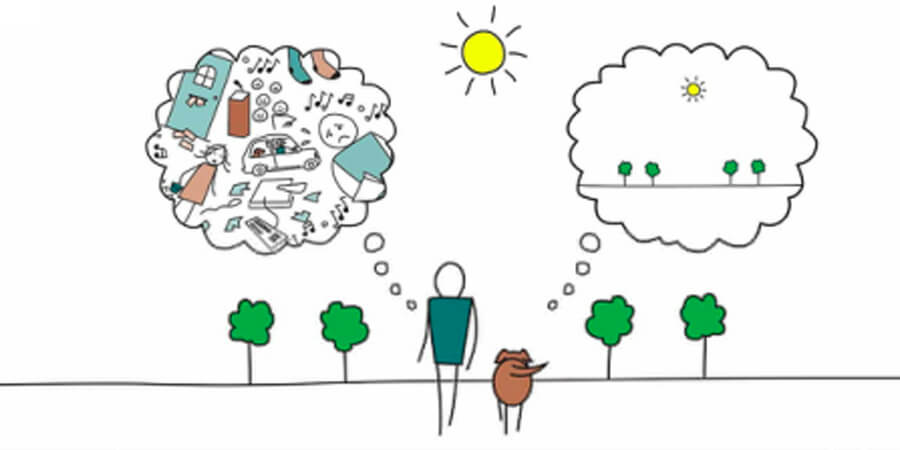Research is uncovering mindfulness to be a powerful aid in the quest to treat Insomnia.
In recent years, there has been a huge amount of scientific interest in the benefits of mindfulness to many aspects of health and wellbeing, including Insomnia. After describing what Mindfulness is, we present some interesting summaries of clinical research trials (including one by Dr Melissa Ree from Sleep Matters) that have demonstrated Mindfulness as effective in the treatment of Insomnia.
What is mindfulness?
Being Mindful is being aware of the present moment in a purposeful and accepting way. Consciously choosing to be aware and accepting, in the moment, of what you are seeing, smelling, touching, tasting, hearing, feeling and thinking. In a mindful state, we don’t think ahead to the future, and we don’t re-live the past, we are aware of and accept the present for what it is. Encouraging the mind to be regularly in this state has a whole host of long term benefits. For those who would like further information I’d suggest Ruby Wax’s book “A mindfulness cure for the frazzled” as a very entertaining and useful overview. Ruby’s definition of mindfulness “isn’t about sitting erect on a hillock, legs in a knot, humming a mantra that’s probably the phone book sung backwards, it’s something that can help us all: learning to notice your thoughts and feelings so you can truly experience life“.
We (human beings) are not very aware of what’s going on a lot of the time, we are often absent minded and running on autopilot (ever forget someone’s name? intended to grab milk on the way home but forgot?). Improving memory is not the only benefit to paying attention mindfully: when mindful we become aware of aspects of life that otherwise may just slide by us, both the good and the bad.
- Being aware of the ‘good’ means that life is as rich and pleasant as possible (eg. drinking a cup of coffee and really tasting, smelling and enjoying it).
- Being aware of the ‘bad’ means that we’re in a much better position to take skilful conscious action when difficulty arises. This means that we are less likely to get sucked into old, habitual patterns of reacting when things go wrong or challenging emotions arise. Depression/anxiety/stress/tension can more easily creep up on us when our minds are elsewhere. Left unchecked, these emotions can lead us down unhelpful, well worn paths (eg. snapping irritably at our partner when we are tired).
Mindfulness applied to sleep
One of the biggest barriers to sleep is increased tension. Some people with long term insomnia tell us that they are very tense when they are in bed. Others describe to us that they are no longer tense and rather, are resigned to their poor sleep. The bad news is that when we look more thoroughly, we often find that there is tension there, the good news is that these people do not have to be resigned to a life of terrible sleep.
When we can’t sleep, the thing we want more than anything is the very thing we can’t seem to get. As we try harder and harder to sleep, we become more tense, and so begins a struggle. The night goes on, our desperation for sleep increases and so does our sleeplessness. This gap between our present state and where we want to be can bring up a range of unpleasant emotions (anger, tension, anxiety, frustration, helplessness, tears). Mindfulness suggests that we drop the focus on the goal of getting to sleep. Mindfulness offers an alternative ‘goal’. Rather than trying to get to where we want to be, we re-focus attention on where we actually are. We stop trying to fight the situation, and instead accept it without judgement. This is quite a shift in strategy for dealing with sleep problems. It recognises that that frustration/anxiety/resignation about not sleeping are at the core of keeping the problem going. Finding a way to let go of these emotions resolves a large piece of the puzzle of sleeplessness. Mindfulness clears the way for the natural process of sleep and wake to unfold, less hampered by tension.
The research into the use of mindfulness techniques in the treatment of Insomnia is still developing, but it is gaining traction within the field of behavioural sleep medicine. Next we have a look at what recent research suggests about the benefits of mindfulness to healthy sleep.
What the science says……
There are now many controlled clinical trials that investigate mindfulness in the treatment of Insomnia. Some research is suggesting that it may be as effective as sleeping pills but without the side-effects.
- Mindfulness can enhance Cognitive Behaviour Therapy for Insomnia (CBT-I). CBT-I is widely accepted as the gold standard in Insomnia treatment (see here for a blog post on treatment guidelines), and researchers are continually working to understand how best to make this treatment maximally effective. Dr Melissa Ree from Sleep Matters along with colleagues from Murdoch University recently published a study that suggests that mindfulness may be a useful addition to CBT for Insomnia. In the treatment trial, people with Insomnia underwent a standard 4-session CBT-I treatment. Half the participants went on the receive 4 sessions of further therapy, one of these being Mindfulness Based Therapy. The results suggested that receiving 4 sessions of Mindfulness Based Therapy significantly improved outcomes – people slept better and felt better during the day after the additional treatment. What’s more, it seems that it helped that the additional treatment was not just more CBT. The addition of a different treatment was beneficial for the latter 4 sessions.
- Mindfulness alone can be effective as a treatment for Insomnia from adolescence to elderly. Recent studies have investigated the the effects of mindfulness on Insomnia in adults, older adults, and adolescents.
- Mindfulness as an Insomnia treatment in adolescence. An interesting school-based study investigated the effects of mindfulness-based sleep interventions during school time, among a group of year 9 students who were suffering with poor sleep. Following Mindfulness training, the students experienced improvements to sleep (reduced time to fall asleep, better sleep efficiency, and greater total sleep time).
- Another recent trial of 54 adults with Insomnia found that mindfulness-based treatments led to significant sleep improvements such as reduced insomnia severity, awake time at night, and arousal levels before bed. Further, the improvement were durable across the 6 month follow-up period.
- A recent treatment trial of older adults with Insomnia symptoms found that mindfulness led to significant improvements in sleep. Improvements were found in insomnia symptoms, daytime fatigue, and depression.
- Be mindful during the day to improve sleep at night. A study published in 2014 found that Mindfulness practices during the day are associated with better sleep quality at night. It appears that mindfulness during the day increased people’s ability to detach their mind from daytime business during the evening hours—and this was a factor in sleep improvements.
Interested? Where to next?
1. There are lots of options for getting a mindfulness practice established. Smiling Mind and Headspace are two very good apps to get you going.
2. Mindfulness WA are experts in applying mindfulness to a range of psychological difficulties.
3. The team at Sleep Matters can assist with specific Insomnia treatment that utilises mindfulness practice.

